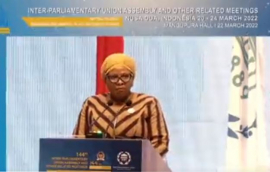
South Africa's National Assembly Speaker, Nosiviwe Mapisa-Nqakula, has urged the heads of parliament around the world to take all necessary steps to deal with climate change.
This, Mapisa-Nqakula said, can be done through oversight and other interventions with the constitutional powers of the institutions they lead.
Mapisa-Nqakula is leading a multiparty delegation of senior members of the South African Parliament to the 144th Plenary Assembly of the Inter-Parliamentary Union (IPU), currently underway in Bali, Indonesia.
The IPU is a global organisation of national parliaments that facilitates parliamentary diplomacy, and empowers parliaments and parliamentarians to promote peace, democracy and sustainable development worldwide.
Addressing the delegates on Monday, Mapisa-Nqakula said the 144th session, themed ‘Getting to Zero, Mobilising Parliaments to Act on Climate Change’, enjoined the IPU to reflect on the question of ‘climate change’ and the need to mobilise parliaments to act swiftly in reducing its negative effects.
The Speaker said tackling climate change has far-reaching implications for socio-economic development, production and consumption patterns.
She said climate change remains a serious global threat to national and international development, and its impact has continued to exacerbate at a time when the world is also dealing with the aftermath of the COVID-19 pandemic.
“The poor and the most vulnerable, on the [one] hand, have borne the greatest brunt and suffered the most due to the impact of climate change. It is worth mentioning that the manner in which climate change affects us depends on where we are located on the global map,” Mapisa-Nqakula said.
As it could be expected, she said, the hardest hit population groups are poor people, who are in the main, inhabitants of developing countries and are predominantly farmers who depend on rain-fed and basic mechanisms for tilling the land and earning a livelihood.
She argued that the only way their conditions can change is through policy shifts.
“Critical to this is dedicated action on the part of policy-makers and the people who represent them, like legislators and Members of Parliament. Great changes throughout history have been born out of crisis − we should therefore not waste this moment,” Mapisa-Nqakula said.
The Speaker also confirmed South Africa’s appreciation of the outcome of the Glasgow Climate Change Conference, which called upon the international community to rally behind a shared objective to act with a greater sense of urgency, based on international equity and the latest available science.
She said South Africa’s main priorities remain focused on securing an ambitious and progressive finance and adaptation package to support the African region and other developing countries to alleviate the negative impact of climate change.
“In South Africa, we support the government’s view articulated by the President on the green recovery for our country. It is our view that the Rome COP 26 legislative prescripts can and must safeguard the planet’s ecosystems, reduce emissions of greenhouse gases, and limit global temperature increases.
“In this instance, we call on the high income countries to step up and take responsibility given the fact that they continue to benefit most from the use of fossil fuels. Tackling climate change had far-reaching implications for socio-economic development, production and consumption patterns,” she said.
The 144th Assembly of the IPU kicked off on Sunday, and scheduled to conclude on Thursday with the adoption of a wide range of resolutions.
The South African Parliament delegation to the 144th IPU includes Mapisa-Nqakula, National Council Of Provinces Deputy Chairperson Sylvia Lucas and National Assembly House Chairperson Cedric Frolick.
The delegates also include African National Congress (ANC) Deputy Chief Whip Doris Dlakude, ANC MP Fikile Masiko, Democratic Alliance MP Dr Annelie Lotriet, and Economic Freedom Front Chief Whip Floyd Shivambu. – SAnews.gov.za


